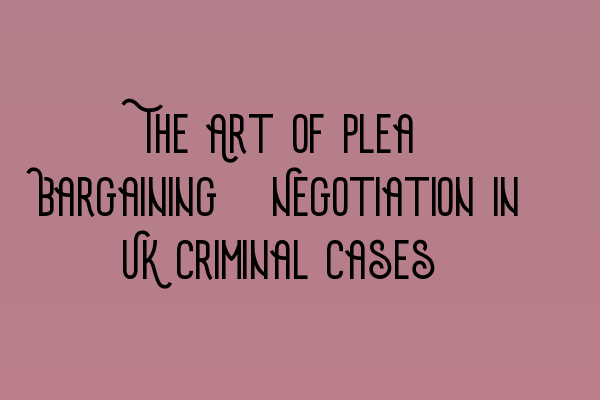The Art of Plea Bargaining: Negotiation in UK Criminal Cases
Introduction:
Plea bargaining is a crucial aspect of the criminal justice system in the United Kingdom. It involves negotiations between the prosecution and the defence, with the aim of reaching an agreement on the charges and potential sentence for the defendant. This practice, though often controversial, plays a significant role in ensuring the smooth functioning of the criminal justice system. In this article, we will delve into the art of plea bargaining, exploring its benefits, challenges, and its impact on criminal cases in the UK.
Benefits of Plea Bargaining:
1. Time and Cost Efficiency: Plea bargaining helps to expedite the legal process, as both parties can save considerable time and resources by avoiding lengthy trials.
2. Certainty: By entering into a plea bargain, defendants can achieve certainty in terms of their sentence and a faster resolution of their case.
3. Reduced Sentence: The negotiation process may result in reduced charges or a lighter sentence for the accused, offering a potential incentive for plea bargaining.
4. Judicial Resources: Plea bargaining can alleviate the burden on the courts and ease case overload, allowing judges to allocate their time and resources more effectively.
Challenges in Plea Bargaining:
1. Ethical Considerations: The negotiation process raises concerns about potential coercion, unequal bargaining power, and the risk of innocent defendants accepting a plea due to the pressure of the situation.
2. Discretionary Powers: The discretion enjoyed by prosecutors and judges in accepting or rejecting plea bargains may lead to inconsistency in outcomes, undermining the principle of equal justice.
3. Public Perception: Critics argue that plea bargaining erodes public confidence in the criminal justice system, as defendants may appear to be receiving lenient sentences for their crimes.
4. Overuse: In some cases, plea bargaining has been criticized as an overused and default option, with defendants feeling compelled to accept bargains regardless of their guilt or innocence.
Negotiation Strategies for Plea Bargaining:
1. Gather Evidence: A solid understanding of the case and the evidence available is essential for negotiating a plea bargain effectively.
2. Assess Strengths and Weaknesses: Identifying the strengths and weaknesses of the prosecution’s case can help in negotiating for a favorable outcome.
3. Communication: Effective communication between the defence counsel and the prosecution is key to reaching a mutually beneficial agreement.
4. Creative Solutions: Exploring alternative sentencing options or conditions can help strike a balance for both parties involved.
5. Expertise: Engaging an experienced criminal solicitor who is adept at negotiation can greatly enhance the chances of success in plea bargaining.
Conclusion:
Plea bargaining, despite its controversies, remains an integral part of the criminal justice system in the UK. It offers benefits such as time and cost efficiency, certainty, and the potential for reduced sentences. However, challenges such as ethical concerns, discretionary powers, public perception, and potential overuse need to be carefully addressed. By employing effective negotiation strategies and seeking legal expertise, defendants can navigate the plea bargaining process with increased confidence. Ultimately, the art of plea bargaining must strike a delicate balance between efficiency, justice, and the protection of the defendant’s rights.
